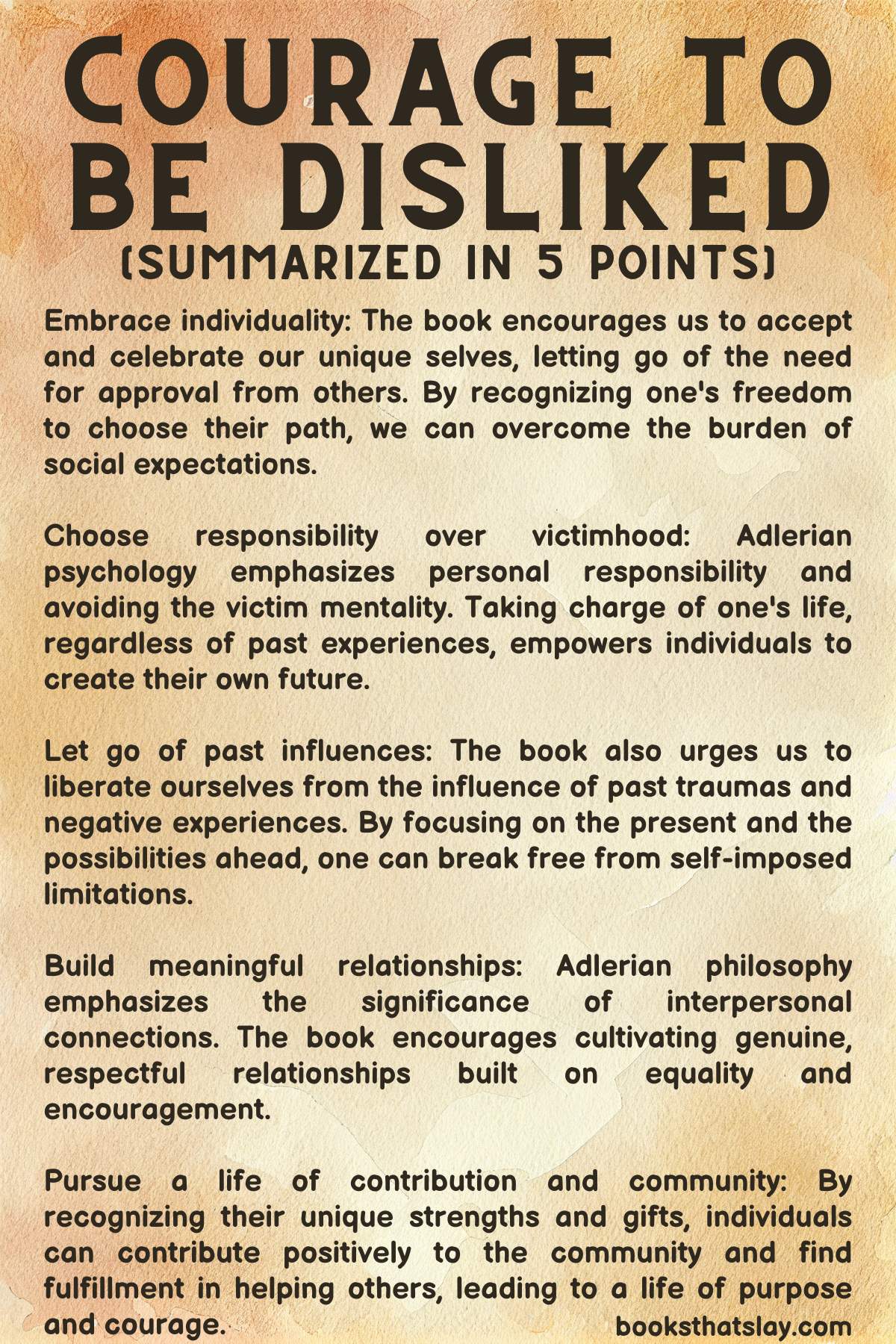The Courage To Be Disliked | Summary and Key Lessons
“Courage to be Disliked,” written by Ichiro Kishimi and Fumitake Koga, is a unique self-help book that guides readers through the concepts of Alfred Adler’s individual psychology using a philosophical dialogue between a philosopher and a disillusioned young man.
This approach, which relies on Socratic dialogues, makes it different from other books in its genre.
The book was first published in Japanese in 2013, and it quickly became a bestseller in Japan and subsequently worldwide.
Courage to be Disliked Summary
The title refers to the courage needed to break free from societal chains and others’ expectations, allowing one to live authentically and happily without concern for external validation.
1. The core of Adlerian psychology
The book begins with an overview of Alfred Adler’s individual psychology. It emphasizes the Adlerian concept that all problems are interpersonal relationship problems, marking a distinct departure from Freud’s psychoanalytic view.
2. Separation of tasks and self-reliance
The authors discuss the concept of “separation of tasks” – the idea that each person is responsible for their actions, feelings, and happiness. Adlerian psychology insists on the self-reliance and individual agency of people in shaping their lives.
3. The past does not determine the future
This book discredits the Freudian idea that past traumas determine present behavior. Instead, it promotes the idea that we are not products of our past but creators of our future. It argues that we have the power to reinterpret our past and change our life’s narrative.
4. The courage to be disliked
The book emphasizes that being disliked by others is a consequence of living authentically. The authors suggest that to live a fulfilling life, one must have the courage to disregard other people’s opinions or judgments and make decisions based on one’s values and principles.
5. Life-lies and the feeling of inferiority
According to the book, life-lies are stories people tell themselves to avoid change and responsibility.
The authors explain that individuals often use the feeling of inferiority as an excuse to avoid confronting their issues. They suggest overcoming this by converting the feeling of inferiority into a feeling of community, striving to contribute to others’ wellbeing rather than focusing solely on personal success.
6. Vertical and horizontal relationships
The book explains that a vertical relationship is one where someone is superior or inferior, while a horizontal relationship is one of equals. It emphasizes that individuals should aim to build more horizontal relationships, founded on respect and equality, to lead happier lives.
7. Teleology over causality
The authors focus on Adler’s idea of teleology – the idea that humans are goal-oriented beings. It proposes that understanding a person’s behavior requires knowing their future goals rather than their past experiences.

Also Read: Meditations by Marcus Aurelius | Book Summary
What can you learn from the book? [Top 4 Lessons]
1. The Power of Separation of Tasks
Kishimi and Koga advocate for the individual responsibility and argue that we are not responsible for the feelings, thoughts, or behaviors of others.
They emphasize that each person’s life task is their own. For instance, if someone reacts negatively to a constructive comment you’ve made, it’s their task, not yours, to deal with that reaction.
This idea is derived from the psychological theories of Alfred Adler, a contemporary of Freud and Jung, who proposed that all problems are interpersonal relationship problems.
By accepting the separation of tasks, we can begin to live more authentically, avoid unnecessary interpersonal conflicts, and not carry undue burdens for others’ emotions.
2. The Theory of Teleology vs. The Theory of Causality
The book introduces two contrasting theories: Teleology and Causality. While the theory of causality posits that current events are caused by past events, the theory of teleology argues that individuals are more influenced by their future goals and subjective perceptions of reality.
Kishimi and Koga, underlining Adler’s psychology, suggest that we are not the product of our past experiences or traumas but rather the meanings and interpretations we give to those experiences.
For example, two people experiencing the same adversity may respond differently, with one using it as a reason to give up and the other as motivation to overcome.
3. Lifestyle is Not Something Given, but Something Chosen
The authors state that one’s lifestyle is not determined by circumstances, past, or environment, but is a matter of personal choice. It is an empowering lesson that posits everyone has the power to influence their destiny and shape their reality.
For instance, the authors argue that feeling of inferiority is not an adversity, but a starting point. From this perspective, what we often perceive as inferiority complex is, in fact, a life-lie to justify our lack of courage to change.
By understanding that we have the ability to choose our responses and attitudes, we can turn the feeling of inferiority into a drive for self-improvement and achievement.
Also Read: Man’s Search For Meaning | Book Summary
4. Recognition and Contribution to the Community
According to Adlerian psychology, all individuals have an innate desire to belong and contribute to society.
Kishimi and Koga argue that the pursuit of superiority often leads to feelings of isolation and competition. In contrast, contributing to the well-being of others brings about a sense of connection and fulfillment.
This idea is epitomized in Adler’s concept of ‘Gemeinschaftsgefühl’, or ‘community feeling’. It suggests that happiness is found not in being superior to others, but in feeling connected to others and making a meaningful contribution.
Therefore, instead of competing with others for recognition, we should focus on how we can cooperate and contribute to the community.
Final Thoughts
“Courage to be Disliked” provides a refreshing and empowering perspective on personal development and interpersonal relationships. By challenging commonly held beliefs about selfhood and society, it encourages us to embrace authenticity and the freedom that comes with disregarding societal expectations.
Also Read: